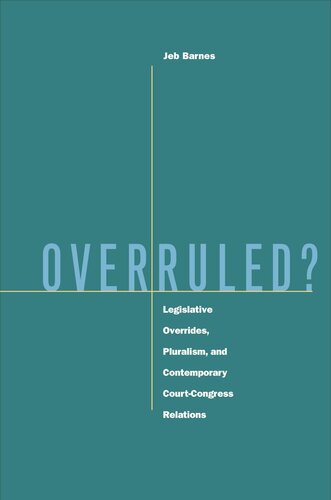

Most ebook files are in PDF format, so you can easily read them using various software such as Foxit Reader or directly on the Google Chrome browser.
Some ebook files are released by publishers in other formats such as .awz, .mobi, .epub, .fb2, etc. You may need to install specific software to read these formats on mobile/PC, such as Calibre.
Please read the tutorial at this link: https://ebookbell.com/faq
We offer FREE conversion to the popular formats you request; however, this may take some time. Therefore, right after payment, please email us, and we will try to provide the service as quickly as possible.
For some exceptional file formats or broken links (if any), please refrain from opening any disputes. Instead, email us first, and we will try to assist within a maximum of 6 hours.
EbookBell Team

4.3
98 reviewsSince the mid-1970s, Congress has passed hundreds of overrides—laws that explicitly seek to reverse or modify judicial interpretations of statutes. Whether front-page news or not, overrides serve potentially vital functions in American policy-making. Federal statutes—and court cases interpreting them—often require revision. Some are ambiguous, some conflict, and others are obsolete. Under these circumstances, overrides promise Congress a means to repair flawed statutes, reconcile discordant court decisions, and reverse errant judicial interpretations. Overrides also allow dissatisfied litigants to revisit issues and raise concerns in Congress that courts have overlooked. Of course, promising is one thing and delivering is quite another. Accordingly, this book asks: Do overrides, in fact, effectively clarify the law, reverse objectionable judicial statutory interpretations, and broaden deliberation on contested issues? The answers provide new insights into the complex role of overrides in U.S. policy-making and in the politics of contemporary court-Congress relations.